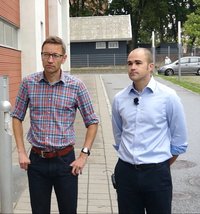INDR editorial, December 2016

Steroids myths, hormonal rebalancing, anti-doping balance and a conference on the horizon
INDR Newsletter, December 2016 editorial, by Ask Vest Christiansen and John Gleaves
As the holiday season is drawing near and we all are sprinting towards finalising a number of tasks before the break, we are pleased to provide you with the last of four 2016 INDR Newsletters. In addition to an invitation to submit abstracts for the 2017 INDR conference, it contains three interesting commentaries.
Abstract submission is now open
The International Network of Doping Research (INDR) invites abstract submissions for consideration for the 2017 conference to be held at Aarhus University, Denmark on 24-25 August. Abstracts should be between 350-500 words and include author(s), title, institutional affiliation and demonstrate some relation to the conference theme or to themes related to the INDR mission. Authors from any field are encouraged to present research that relate to the conference theme and questions in the humanities or social sciences. Abstracts should be submitted by 14 April 2017, via the INDR online submission system: https://easychair.org/conferences/?conf=indr2017 . It should be straightforward to use the system, but in case you need instructions for using the Easy Chair submission system, you will find them here.
As noted earlier, the conference theme is “Doping in sport, doping in society – lessons, themes, and connections.” The idea is to thematise how performance enhancement is more than just a matter for elite sport. Though research has often focused on doping practices in sport, recent scholarship has indicated how deeply rooted questions about doping and performance enhancement are to society as well. Perhaps doping is not just one branch of elite sport, which is just a one branch of human culture. Instead, performance enhancing-substance use and practices seems to be a connecting thread that runs throughout many of society’s branches. From fitness cultures to the desire to be “better than well”, always perform at one’s best and extend human capacities in various careers and across the lifespan. At the same time, the moral, legal, and health concerns raised by humans employing enhancements exist in society as well as elite sport.
To approach these issues, we invite not only scholars from across academia to share their insights as they assess how the imperative of performance now penetrates not only elite sport but also many other areas of life. We are proud to announce that the following experts have already accepted to give keynote addresses:
- Professor John Hoberman, University of Texas
- Professor Sigmund Loland, The Norwegian School of Sport Sciences
- Professor Bengt Kayser, University of Lausanne, Switzerland
- Dr. Jason Mazanov, Editor in Chief of Performance Enhancement & Health, Australia
Commentaries
Anders Schmidt Vinther, who works with an anti-doping municipality department in Denmark, is problematizing the myth about an apparent epidemic rise in the use of anabolic androgenic steroids in and around fitness environments. He has gathered evidence from the available longitudinal prevalence studies and analysed the findings, which he presents in his commentary The steroid ”epidemic” myth.
Our French colleague Christophe Brissonneau presents some of the findings from his upcoming book Doping, Deviance, and Sports, which he has co-authored with Jeffrey Montez de Oca. In a his commentary entitled Biological preparation and hormonal rebalancing in France (1950-2016) Brissonneau presents interesting historical discoveries on how medical doctors have helped athletes prepare themselves for competition with various drugs e.g. amphetamines and anabolic steroids.
Lastly, we have a short presentation of Olivier de Hon’s PhD-thesis ‘Striking the Right Balance – Effectiveness of Anti-Doping Policies’. Olivier de Hon is scientific expert at the Anti-Doping Authority of the Netherlands and he successfully defended his thesis at the Utrecht University in the Netherlands in November 2016. Congratulations to Olivier de Hon!